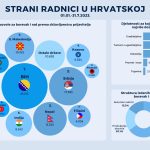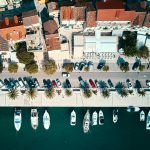Here at Varteks, we can see the 50+ years of decay. We are now discarding supplies, including buttons that someone ordered and bought 20 years ago, said Nenad Bakić.
“Until recently, the chairman of the board drove with a driver in the official A8, and the minimum wage wasn’t even paid to workers. I think that with a radical change in the business model we can get better quality and go a step further. The suits which we produce today are literally the best of the best quality-wise,” reports Express on March 16, 2019.
He then presented optimistic development plans. “Through our retail section, we will return brands to the Croatian market and soon present ourselves to the international market with modern products. As for employees, we are ready to accept any worker who wants to return. If some of the other companies here were to go bankrupt, we would be ready to reopen a second shift. These are the plans we are ready for, but we have not yet started them.”
You are involved in an experiment that is risky for several reasons. First, it is about the textile industry that is considered to be dead in this part of the world, and secondly, you have invested a lot of money. What brought you to that?
I’m a long-term, so-called “deep value” investor and, if necessary, an activist investor. I do not consider my investment in Varteks to be any different than, for example, in Valamar, which was a much more significant investment for me, or, for example, Lošinjska Plovidba. But the collapse of the Varteks business led to the destruction of value and ultimately required recapitalisation. Since there were no interested investors, and I had already become a large shareholder, I thought that the amount foreseen in the call for recapitalisation was sufficient to turn the trend around. It turned out that it was not enough. Then, as Varteks needed more money and was completely cut off from financial markets and banks, I had to start borrowing for salaries and other obligations, so my investment became larger. Of course, I did all this because I could see the potential. And I can still see it today, but it seems that the whole investment will be significantly more demanding. However, success isn’t guaranteed since the textile and fashion industry is very demanding and our starting position is extremely tough. Unfortunately, we are also hitting some of the “mines” of parasitic structures that have spread into ministries at the highest of levels, people who “have Croatia” and constantly speak about “statehoodness.”
Many Croatian companies in this branch did not succeed. Have you analysed these cases?
I would say that Heruc was a typical Croatian transition real estate investment. I did not follow the DTR case. However, textile and fashion businesses are very demanding, given the low costs of global production and the dominance of global brands.
You said that this branch in Croatia would see even more difficult days ahead. Why do you think that?
The textile and fashion industries are not the same thing. The Croatian textile industry is not price competitive. On the one hand, there are global producers with a significantly cheaper labour force, and on the other hand European producers who have been able to upgrade their plants with EU funds and become more competitive. Our EU negotiators made a big mistake and determined that large companies can’t get EU funds, only small and medium-sized ones. This was in accordance with their failed Marxist views about the “conflict of labour and capital.” Namely, why should you help companies with substantial capital, because that inevitably goes against the workers. The truth is precisely the opposite; the work is more valuable when there is capital. Thus, textile companies in Bulgaria and Poland have been upgraded, and their wages are higher, while our remaining companies cannot pay salaries. On the other hand, big companies help small ones. We have just saved a medium sized company, our partner in the textile industry. I think all textile companies will soon be unable to continue doing business. Rescue will be possible just for those who have their own brands and retail, and Varteks is uniquely positioned in this regard. I, therefore, expect the number of Croatian workers to start growing soon, but we have not yet considered importing foreign workers.
Your company has enormous inherited problems due to decades of decay. I suppose these problems are similar to those in many other businesses in Croatia. Can you describe them in more detail?
First, financial devastation – no working capital or investment funds, and a lot of accumulated liabilities. Second, technological backwardness. Third, managerial and cultural devastation – too few good people, although some of them are excellent, whom we have recognised as possible transformers. Fourth, misunderstanding of the market economy, in terms of brand positioning, pricing policy, client approach… Fifth, an outdated business model.
How will you solve them?
We have significantly updated the design of our major products, suits, to match the quality we produce for some of the world’s leading brands, such as Hugo Boss. We have a very active webshop and marketing strategy focused on digital channels. We have lowered prices for some products to be cheaper than the competition. We are rapidly developing new products. We have started proving the quality of our products with our limited collections of suits and coats using the world’s most delicate fabrics.
Varteks has recorded some 800 million kuna of losses in the last ten years. That is 80 million a year, a lot of money… How did they cover it?
Mostly by selling one of the most impressive real estate portfolios anyone had in Croatia. Just remember the department store at the main square in Zagreb.
How will you cope with the competition from Turkey, China and similar countries?
Let’s look at production first. The question is what is competition. Almost all of the largest global brands produce in low-cost countries. Even we create some of the products that are not essential to us in Turkey. But, for example, Hugo Boss, which has its own large production in Turkey, still makes some of the key products in Croatia. The reasons are high quality and speed. Today, in fashion, there is the trend of quick changes to the collections and frequent updates, which means that production is often located as close to the place of consumption as possible. So, we have a chance to organise production with higher profitability. For now, we are doing very well in returning Varteks’s market position in that segment, and I do not see why it would not continue.
You have announced that you need more workers. Is Varteks burdened with excessive administration and a shortage of workers in production and creative personnel in the broader sense?
We have a shortage of creative people, such as constructors and designers, but we also have too many people in the administration segment because some of them are not doing their jobs at the level people in production do. We will continue to look for improvements. Our key competencies are creators, strong sales and marketing staff, and above all, workers and managers in production. My heart will always be primarily with the workers in production, and I believe that everybody else who does not do their job correctly is actually stealing from their pockets.
Where will Varteks be positioned, in which segment of the market? What will be the ratio of the local market and exports?
In sewing for others, the emphasis is on exports. In fashion, we will first at least double the market share in Croatia and increase exports in parallel. We have just experimentally enabled the purchase via webshop in Slovenia, which will be followed by some other European Union countries. Of course, as soon as we see that a market has a demand, we start looking for local partners, as we have already done in Bosnia and Herzegovina. We will soon present a line of sports, outdoor clothing, with military quality and similar designs. I am sure it will be an export product as well. All in all, we will be positioned as a producer of high to very high-quality products at a medium price. In short, strictly market orientation, with maximum focus on the client.
You are demonstrating that it is possible to have the industry in Croatia. What would you do to make it better, easier, more efficient?
I do not know whether I am demonstrating that, I am only proving that it is worth trying. Among the measures, I would ask the media to ridicule all the pests, including some ministers, who are persistently imposing on the nation the ancient ideals of the “statehood” economy, for the sake of maximising their personal interests through networking with strange structures in the Croatian economy and society in general. I would order all the elements of public administration system to serve those who pay them. Can you believe that an assistant minister recently said to me, as an investor partner in Đuri Đaković, who saved the company that was supposed to be a Slavonian version of Uljanik: “You lost nice money on Petrokemija, and I would not sleep peacefully if I had shares of Đuro Đaković.” He did it at the moment when he tried to convince me that there should be a new “uhljeb” appointed as the CEO. Imagine how many seconds would such a person last in a normal country if he were to speak to an investor, let alone a partner, like that. The terror of these people who “have Croatia” must stop. I would reduce bureaucracy and taxes. Perhaps it looks like some things cannot be changed, but let me remind you that in the most challenging area of all, education, we have made a revolution with the Croatian Makers project and launched the most extensive such programme in the EU. Moreover, in one of our programmes, we are creating an avant-garde, large project in Croatia, Serbia, Bosnia and Kosovo, in partnership with Google, which is unthinkable in other segments. We have demonstrated that Croatia can be a leader.
What do you think about the plans for the salvation of Uljanik and 3. May shipyards? Does Croatia need the shipbuilding industry?
The question is what is “Croatia”. Is it a worker who should just this year pay 5,000 kuna, and maybe that 5,000 kuna is needed elsewhere? Or is it some politician, or perhaps some reseller of steel etc.?
Some say that Croatia is unprepared for significant reforms and it would be a good idea to start at least with the small ones. What do you think about this?
I do not believe in such defeatism. As a charity organisation, the IRIM has created a tsunami with its Croatian Makers movement and laid the foundations for a social revolution in the next 5-10 years. Of course, we should be doing marginal measures as well, but I do not agree with the abandonment of the larger ones.
How long can Croatia continue like this?
Forever. In addition to tourism, we also have remittances from overseas workers, which are now about two times higher than direct foreign investments. It is also necessary to add other parts of the so-called secondary incomes, such as pensions from abroad. Direct foreign investments will, however, increase, but towards rent activities, mostly tourism. So, we will have resources for endless maintenance on this trend. If we are satisfied with demographic, relative material and spiritual decline, we will have no problems with sustainability.
Ireland had about 3.9 million inhabitants in 2003 and Croatia had 4.67 million people. Today, Ireland has almost five million people, while Croatia has fallen to four. Can Croatia do something similar to Ireland?
Yes.
More news about Nenad Bakić can be found in the Business section.
Translated from Express (reported by Boris Rašeta).








